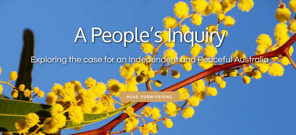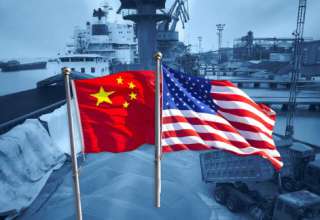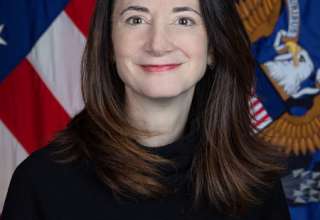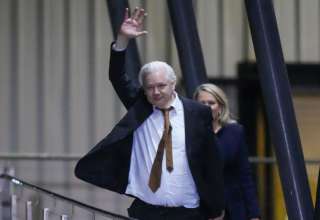Recently Bevan Ramsden from IPAN did a radio interview with CICD’s Alternative News broadcast on Radio 3CR reviewing IPAN’s (Independent and Peaceful Australia Network) People’s Inquiry. This post contains both the text and audio files of this interview.
Audio: Review of IPAN’s People’s Inquiry
 ANDREW: My name’s Andrew and I have with me Bevan Ramsden. We’re from IPAN, the Independent and Peaceful Australia Network. In today’s CICD Alternative News we discuss IPAN’s People’s Inquiry into the costs and consequences of Australia’s involvement in U.S. -led wars and consider alternatives to the U.S-Australia military alliance.
ANDREW: My name’s Andrew and I have with me Bevan Ramsden. We’re from IPAN, the Independent and Peaceful Australia Network. In today’s CICD Alternative News we discuss IPAN’s People’s Inquiry into the costs and consequences of Australia’s involvement in U.S. -led wars and consider alternatives to the U.S-Australia military alliance.
Bevan, why did IPAN decide to initiate this People’s Inquiry?
BEVAN: I think IPAN’s chairperson, Annette Brownlie, put it well when she wrote in the Inquiry website: “The People’s Inquiry was launched to get organisations and individuals across Australia to contribute to a national conversation about all aspects of the U.S.-Australia alliance, including the social, political, military and defence, economic and environmental impacts, to create a more nuanced and informed foreign policy. This Inquiry is only as strong as its submissions and having informed and varied voices will be integral, we look forward to hearing from you.”
ANDREW: I understand that there has been a significant response to IPAN’s call for submissions from organisations and individuals, with in excess of 170 submissions received thus far. Concurrent with the submissions and to obtain comment from an even wider group of individuals, IPAN produced a questionnaire on attitudes to the U.S-Australia military alliance and has received over 1,000 responses. Bevan, what other activities have been conducted as part of the Inquiry?
BEVAN: To stimulate interest in the inquiry and encourage individuals and organisations to send submissions, IPAN has conducted a number of webinars featuring panel members of the Inquiry. Topics included economics and social impacts, Defence and foreign policy, democratic rights and impact on workers, impact on first nation peoples and impact on the environment. Between 70 and 100 people attended each of these webinars.
ANDREW: Bevan, it’s interesting to see the varied perspectives of the people who’ve made submissions to the Inquiry. Let’s look at some of these.
BEVAN: Cameron Leckie is a former major in the ADF who served in Iraq. He writes in his submission: “I served as an officer in the Australian Army for 24 years. I believe that our alliance with the United States is detrimental to our
national security and as such should be reviewed”. He continues: “Based on the conclusion that the US is the world’s most dangerous nation the paper will propose that Australia should move from a strategy of strategic dependence on the US to one of strategic independence. This is assessed as being the approach most likely to ensure Australia’s future security in an increasingly unstable world.”
ANDREW: Pamela Collett gave this reason for making her submission: “Profound concern about the consequences of the ANZUS alliance and the current USA proposal to resurrect the First Naval Fleet to be stationed in our region”. She went on to say: “China is the ascending world power, not only in our region but also globally. Australia must learn how to use diplomacy effectively to develop neutrality and peaceful coexistence with China and all our neighbours. Having a formal military agreement with the USA and the possibility of being used as a base for the proposed First Fleet would undermine our security and the possibility of peaceful coexistence within our region.”
BEVAN: Linda du Boulay wrote that: “I am frustrated that western society applauds the accomplishments of our war heroes and Anzacs, glorifying murder.” She goes on to say: “War is hell on earth! War causes people who would normally be peaceful people, be forced to take a side and kill to protect their families honour and beliefs. Australians don’t have the death penalty, yet we send our defence force off to kill people who have a different version of life that doesn’t comply with our own. Who are we as Australians to judge or overrule any other countries in the world after our treatment of our own innocent indigenous people with the extravagant lifestyles we have, when compared to other countries, owing to the stolen indigenous generations lands and resources.”
ANDREW: Glen Major said: “To define the truth about foreign policy and how reality is distorted by the western media and politicians to believe an alliance with
America keeps us safe to win votes but factors of scale are not recognized and the arms race and going to war have high social and financial costs…” He continues: “Australia is a peaceful island continent and isolated from active conflict zones in the middle east and other places. We should
limit the scope of our military agenda, to only missions sanctioned by the United Nations in our region where there are critical humanitarian emergencies or threat, or act independently like we did in East Timor where diplomacy and constraint was the strategy for success of the mission, and there was minimal impact on the physical environment.”
BEVAN: Vietnam veteran Noel Turnbull writes: “As a returned serviceman I have had first-hand experience of when our politicians get us into wars at the behest of the US and for no national benefit”. He also writes:”I am a Vietnam veteran who served as an Artillery Officer. I was a conscript and was not opposed to the war at the time. However, after my tour of duty I realised the war was unwinnable and the devastation inflected on Vietnam was unnecessary and criminal.
After returning to Vietnam a number of times since, I became aware of how it might have been become another Asian tiger much sooner if they had not endured the war and the suffering and devastation involved. The killings, the bombings, the defoliants were unnecessary and achieved nothing except destruction.
Subsequently we made the same mistake in Iraq – a war which was made worse in moral terms because of the lies told about WMDs. The situation of the Middle East asa result of US, Australian and UK involvement is a stark evidence of what dreadful mistakes were made.
All this is clear evidence of the need for commitment of troops to be only undertaken after thorough honest debate in our Parliament. Never again should PM’s be allowed to send troops to wars without Parliamentary approval.”
ANDREW: Rosemary Morrow from the Blue Mountains in NSW writes in her submission: “I am profoundly concerned for the potential of Australia’s foreign policy of alignment with USA to back fire and it is provocative.” She continues: “From years and years of working in countries engaged in civil war and recovering from war such Timor Leste, Cambodia, VietNam and Afghanistan and work with Pacific Islands nations I have been aware how much Australia must be Independent and Peaceful facilitator of health, environment and prosperity in our region. Australia is compromised by being engaged with an increasing difficult USA and it has not served us to be with it in such recent engagements in Iraq, Afghanistan and longer ago, Viet Nam. I am also a Quaker deeply convinced that the way to Peace is Peace. And that we will be trusted and consulted when we are independent. The Asia-West Pacific region requires an Independent politics and future.
So in this submission I make a serious and engaged request that all Australia’s policies from now be directed to becoming a Peaceful and Independent Nation.”
BEVAN: In his submission Stephen Horn writes that: “I am concerned about the consequences of further entrenching the country in a system geared to war, and geared away from peace and peaceful coexistence within our region and beyond.”
ANDREW: Lastly, Jamie Piotrowski writes: “Please end Australia’s involvement in wars lead by belligerent war-mongers from the USA and the like, who start wars for economic purpose and lie about true reason.”
BEVAN: We could go on and on. The response to the People’s Inquiry shows that there is widespread concern about Australia’s present foreign policy, our close alignment with the U.S and the calamitous military entanglements that have resulted from it. It indicates a general desire among our people for a more peaceful and independent Australia.
ANDREW: What will be the outcome of the People’s Inquiry and when will we know the results?
BEVAN: I’d like to point out that if any listener to this program would like to put in a submission, there is still time. Submissions can range from a paragraph or up to 5,000 words. To make a submission go to www.independentpeacefulaustralia.com.au , and click on ‘making a submission’. People’s Inquiry panel leaders and chairperson Kellie Tranter will write a report based on a review of all the submissions. In November this report will be launched publicly and released to the media, as well as being tabled in Parliament by some supportive M.P’s. Copies will be published and distributed widely and functions held to publicise its findings and to seek comment and support from organisations and individuals.
ANDREW: Let’s hope this Inquiry’s finding will make an impact and contribute to a serious review of current Australian foreign policy and its close alignment to that of the USA with a view to Australia moving towards a more independent and peaceful approach to foreign affairs.




